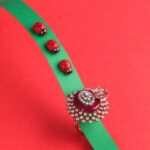Diamonds and platinum jewelry are some of the most precious items that many people own. With their sparkling beauty, these two expensive materials remain highly valued in society.
Of course, since diamond and platinum jewelry is such an investment, it requires special care when cleaning them to maintain their sparkle and shine. Traditional methods of jewelry cleaning can be too harsh on diamonds and platinum, which is why using a homemade jewelry cleaner for diamonds and platinum may be a better choice to preserve their condition.
High Quality Ingredients Homemade jewelry cleaners for diamonds and platinum should consist of high quality ingredients that are both safe for the precious jewelries as well as effective in removing dirt. A common solution for this is plain soap mixed with glycerin or ammonia to create a lathering foam for polishing delicate surfaces gently.
One also needs to use a soft brush with natural bristles like goat hairs, which are strong enough to break up any tarnish yet gentle enough not to damage the diamond’s or platinum’s surface.
The Cleaning Process Once all the ingredients are gathered, the cleaning process can begin by brushing away any dust off the loose stones first before immersing them in the soapy water mixture. From here, one can gently scrub each stone held between fingertips immersed in water while avoiding contact with other gemstones or settings during this step.
After inspecting each piece thoroughly under light magnification (i.e., loop magnifier or microscope), small scratches can be buffed out using clean linen cloth dipped in jewelry oil before air drying off remaining moisture from the surface with absorbent tissue paper or soft muslin cloth without touching the diamond’s surface itself directly if still wet.
Common Ingredients and Tools Needed to Create a DIY Jewelry Cleaner
Jewelry is often a treasured item, and with the proper care, it can last for years. There are numerous commercialized jewelry cleaners available in stores or online, but it is also possible to create a homemade jewelry cleaner for precious gems such as diamonds and platinum. Common ingredients that could be used are baking soda, ammonia, and dish soap. To make this DIY jewelry cleaner you will need a few tools, including an old toothbrush or Q-tip.
Ingredients Used in DIY Jewelry Cleaner
Baking soda, 75 watts of vinegar mixed with one teaspoon of dish detergent, and ammonia are all common ingredients that can be used to create a homemade diamond or platinum jewelry cleaner. Baking soda is highly alkaline and works well as an effective cleaning agent on delicate materials such as diamonds and platinum as it removes dirt without scratching them.
When using this ingredient to clean your jewelry items ensure that too much baking soda does not come in contact with the metal formula due to its abrasive nature.
The combination of vinegar and dish detergent is effective at removing stuck residue from diamond settings while the multidisciplinary qualities of the ammonia provide a deep cleaning effect on deposits within the setting itself as well as providing shine restoring capabilities. The addition of essential oils adds extra protection against corrosion from air molecules which can easily attach themselves to metals if left unprotected for long periods of time.
Essential oils also leave behind a pleasant smell after cleaning unlike other harsh chemicals typically found in commercially made solutions such as bleach or strong alcohols which can damage more delicate stones over long exposure periods.
Tools Needed For DIY Jewelry Cleaner
The tools needed to create your own homemade jewelry cleaner include an old toothbrush or Q-tip which will help agitate dirt and debris while scrubbing deeply embedded particles off from hard to reach places within the metal components of your piece without damaging them further during the process.
Additionally, having an ultrasonic machine available would yield even better results when using these ingredients since ultrasonic machines use tiny bubbles that vibrate at high frequencies allowing them to remove even deeper deposits from within crevices while still being very gentle on both metals and stones found in most pieces of jewelry.
This type of machinery requires special liquid cleaners commonly sold alongside its respective machine so it is important prior research is done before throwing any homemade mixture into one especially if the ingredients are harsher than what is meant for use in that particular model device.
If you don’t have access to an ultrasonic cleaner then simply submerging pieces into this mixture for up to 10 minutes should be sufficient enough at cleaning most diamond and platinum jewelry items found around household home without causing any damage during removal processes afterwards.
How to Create a Homemade Jewelry Cleaner for Diamonds and Platinum
When it comes to jewelry care, one of the most important techniques for keeping diamond and platinum pieces in their best condition is regular cleaning. While there are a variety of commercial jewelry cleaners on the market, creating a homemade cleaner can be an economical, budget-friendly way to keep your jewelry sparkling. With simple ingredients like water, dish soap and baking soda or white vinegar, you can create a safe and effective jewelry cleaner for diamonds and platinum.
Creating your own homemade jewelry cleaner is an easy process that can take as little as five minutes – all that’s required of you is combining distilled water with a non-abrasive dishwashing liquid such as Dawn or Joy and stirring in either baking soda for gold and silver pieces or white vinegar for diamonds and platinum.
If you’re using one solution for both metals, baking soda should be used instead of white vinegar – using vinegar on gold or silver pieces may cause discoloration.
For extremely dirty pieces that require more extensive cleaning, add 1 tablespoon of hydrogen peroxide to the mixture after gently heating the distilled water to about lukewarm temperature.
Once you have your cleaner made, it’s time to apply it to your jewelry: place each piece into the solution (avoiding any metal parts) and let it sit for approximately five to ten minutes before gently scrubbing it with a soft-bristled toothbrush. Allowing extra time will help in getting rid of any difficult grime and dirt stored within the nooks & crannies.
Next, rinse off each piece under cold running water before thoroughly drying with a clean cloth – remember not to ever leave wet/damp jewelry exposed overnight.
Finally, if further shine is desired; use a soft cloth (make sure not to use paper towels) lightly dipped in jewelry polish. With this method consistently applied over time – diamond & Platinum pieces would look just as good as new without ever having to visit a professional jeweler.
How to Use a DIY Jewelry Cleaner
Making your own jewelry cleaner is a cheap and effective way to keep jewelry looking fabulous. It is particularly useful for delicate pieces such as diamonds and platinum which require extra care when cleaning. While the ingredients are inexpensive and easy to find, it still requires some know-how to get the best results.
Choose The Right Ingredients
The most important thing when making a homemade jewelry cleaner is to put together the right combination of ingredients. A mixture of dish soap and warm water is very effective for cleaning diamonds and platinum in particular as this combination is gentle enough that it won’t damage the stones or metal but strong enough to remove dirt and debris.
You can also add baking soda or white vinegar for additional cleaning power, although these should be used sparingly so as not to cause any damage to your precious jewelry.
Washing Jewelry Cases
Before you begin, it’s important to make sure all of your jewelry pieces are inside their cases or another protective container. This will ensure they don’t bump against each other during cleaning where scratching can occur. When mixing your cleaning solution, try not to stir too vigorously as this may cause air bubbles which could attract more dirt particles or scratch delicate metals like silver.
Gently Cleaning Diamonds And Platinum
Once you have mixed your solution together, use a soft cloth or brush specifically designed for cleaning jewelry such as a toothbrush with very fine bristles to gently scrub away surface dirt from the particles without causing any damage.
You should never soak diamond or platinum jewelry in a bowl of cleaner since this will make it much more difficult for the crystals on the stones and settings on metal pieces such as rings, necklaces, bracelets etcto sparkle properly after being removed from said bowl.
Make sure you rinse all pieces thoroughly with cold water before drying them off by dabbing with a lint-free cloth; leaving drops of water on surfaces (especially around prongs), can lead to corrosion.
Considerations When Cleaning Diamonds and Platinum Jewelry
As with all jewelry, safety when caring for and cleaning diamond and platinum jewelry should be a top priority. To avoid any damage to your precious gems, it is essential that you follow the safe practices explained below before using a homemade jewelry cleaner.
Use Gentle Cleaners
In general, homemade solutions should always be gentle. Opt for warm water and mild dish soap instead of harsher alternatives like ammonia or bleach when creating a homemade cleaning solution. Additionally, as tempting as it may be to simply ‘scrub’ dirt away from the gemstones or metal elements of the jewelry, keep in mind that abrasive cleaners can do more harm than good; scraping at grime on the pieces may scratch surfaces or loosen delicate components.
Random Cleaning is Not Effective
Maintenance of diamond and platinum jewelry should not be intermittent. It is wise to clean these pieces regularly – once every 6 weeks – so that dirt does not get a chance to build up over time forming stubborn layers which are difficult to remove without damaging the item itself.
This doesn’t need a laborious effort – rather than aiming to create unique cleaning solutions each time, opt for a gentle homemade soak once in awhile, which will ensure all dirt is effectively removed safely and gradually over time.
Avoid Ultrasonic Machines
If using an ultrasonic machine or hot water dodger for looking after diamonds and platinum pieces this needs careful monitoring – high frequencies associated with this type of device can cause wear on delicate parts without you realizing it straight away. Similarly if hot water is used (those above 40 degrees Celsius) then be sure to avoid immersing very sensitive components like threads or wires – heated liquid could cause deterioration on these items quickly if exposed for too long.
Other Tips for Caring for Diamonds and Platinum Jewelry
When it comes to making sure your diamonds and platinum jewelry remains sparkling, a light-duty homemade cleaning solution can work wonders. But there are many other tips and tricks that you should consider when caring for your precious gems. Aside from periodic deep cleanings with baking soda paste and DIY solutions, proper storage, repair, and maintenance are important in keeping your diamonds and platinum jewelry looking new for years to come.
Storage of Diamonds and Platinum Jewelry
Diamonds and platinum jewelry should be stored in a soft pouch or a box lined with velvet or satin to prevent the pieces from rubbing against each other. It is best not to expose the jewelry to airtight plastic bags as these can create humidity that may cause tarnishing over time.
Remove any pieces before going into a pool or hot tub as chlorine content in the water can also create discoloration or damage the metal settings of the diamond jewelry.
Repairing Damage And Unclasping Links
Damage can happen to both the piece itself or one of its clasps over time; gems may loosen from their settings due to vigorous cleaning. Depending on how severe it is, it is best to have any broken parts quickly repaired by an experienced jeweler before attempting repairs yourself or using an amateur service provider.
Additionally, unclasping links for wearability is something only a professional should undertake as they will know exactly which jump rings are used for each link without risking damage prematurely breaking them open responsible for constructing certain part of the item intact.
Maintenance Strategies
Along with storage techniques and linking services provided by professionals, there are other strategies for basic upkeep you can do at home; taking off rings when doing frequent household chores is one such option. This includes activities like gardening (fertilizers) dishwashing (detergents), kitchen (oils), etc., as these abrasive items tend to loosen gemstones setting and tarnish metals surfaces gradually over time.
Applying lotion on hands before wearing bangles/bracelets helps keep moisture at bay from spills onto stones’ sides; heavy lotions however could dull accompanying gemstones eventually leading to hazy films that rob light entering diamond/platinum settings-gently patting dry them afterwards if exposed is always desirable under such scenario’s case. Finally, remember that even quality pieces may not withstand everyday use no matter how careful you are with them.
When Not to Use a Homemade Jewelry Cleaner
Using a homemade jewelry cleaner on diamonds and platinum jewelry can be tricky; while it is possible, there are some downsides that you should consider. It’s important to remember that not all jewelry is made the same and that some stones don’t react well to certain homemade cleaners; for example, emeralds are often too fragile and easily scratched when cleaned with a commercial cleaner.
Furthermore, some commercially available DIY jewelry cleaner consists of harsh ingredients like ammonia or other chemicals which could damage or discolor your diamond or platinum pieces.
The pros of making your own jewelry cleaner include being able to customize the cleaning solution in order to meet the needs of different materials. For instance, adding baking soda to warm water can produce a gentle solution for softer stones such as pearls. Additionally, making an effective DIY cleaner is often quite economical since many household items already contain all the necessary ingredients for creating a homemade cleaning agent.
On the other hand, one of the most significant drawbacks of using a homemade cleaner on diamonds and platinum is simply not knowing how much pressure you should apply during cleaning and which parts of your pieces should be catered with extra attention in order to avoid any subtle scratching or damaging marks over time.
It’s also crucial to know exactly what kind of metal you have before trying any type of nontraditional cleaning method; platinum is 10 times stronger than gold and so it must be handled accordingly during the cleaning process as anything too abrasive could damage its luster permanently.
All in all, if unsure about how best to begin when cleaning your diamond or platinum pieces at home then it’s advisable to consult with your local jeweler who may offer further sound advice on potential solutions and precautions one can use in order to keep their treasured jewels sparkling without exposing them to harm from inadequate cleanup methods.
Summary and Final Thoughts
Making your own jewelry cleaner is a great way to save money and keep your valuable Diamonds and Platinum pieces looking their best. Homemade jewelry cleaners such as baking soda, ammonia, dish soap, and white vinegar are both safe and easy to make while being better for the environment than chemical-based products. These DIY methods can be used in various combinations to effectively clean most metals including gold, silver, platinum, and diamond stones without damaging them.
When homemade jewelry cleaning solutions are used in combination with a soft-bristled brush, they provide powerful cleaning capabilities that will gently remove dirt and grime from metal pieces without scratching or etching the delicate metal surfaces. The natural pH of these homemade cleaners also help reduce oxidation which could otherwise cause yellowing or discoloration if left untreated over time.
Additionally, using homemade cleaners instead of purchasing pre-made solutions helps you reduce the environmental impact of daily household products by not contributing to further chemicals being released into the atmosphere.
Overall, it is easy to see why homemade jewelry cleaners are an effective means of keeping Diamonds and Platinum in beautiful condition without harming either your wallet or the planet’s health. For those interested in exploring other methods of caring for their jewelry beyond DIY solutions, there are plenty of resources available online including blogs featuring advice from experts on how to properly care for different types of metals.
Furthermore, books written by experienced gemologists can provide a wealth of detailed information for those seeking more in-depth knowledge on the subject.

Welcome to my jewelry blog! My name is Sarah and I am the owner of this blog.
I love making jewelry and sharing my creations with others.
So whether you’re someone who loves wearing jewelry yourself or simply enjoys learning about it, be sure to check out my blog for insightful posts on everything related to this exciting topic!





